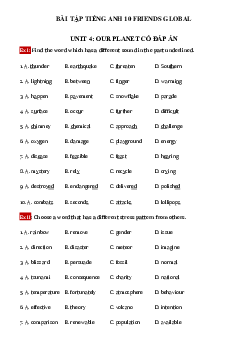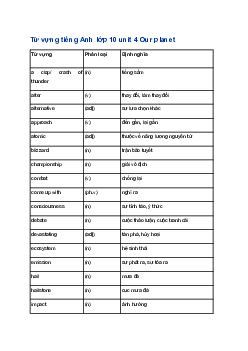






Preview text:
Giải Unit 4 Lớp 10: 4B Grammar trang 48 Bài 1
Read part 1 of the text. What is a shooting star?
(Đọc phần 1 của bài khóa. Sao băng là gì?) Part 1:
On a clear night, you can often see meteors – space rocks- as they fall towards the
Earth. Each rock is smaller than an apple, but they look as bright as stars in the night
sky, so people call them 'shooting stars'. Larger meteors are much rarer, but their
effects are far more spectacular.
In 2013, a meteor exploded in the sky above the city of Chelyabinsk in Russia. The
explosion was more powerful than the 1945 Hiroshima atomic bomb, but its effect
was not as devastating as the bomb because the meteor exploded much further from
the ground. Scientists compared the Chelyabinsk meteor to an earlier - and far bigger -
explosion: the Tunguska Event. Tạm dịch: Phần 1:
Vào một đêm quang mây, bạn có thể thường thấy các thiên thạch – đá vũ trụ - khi
chúng bay đến Trái đất. Mỗi viên đá thì nhỏ hơn một quả táo – nhưng chúng nhìn
sáng như những vì sao trên trời đêm, nên mọi người gọi chúng là “sao băng”. Những
viên thiên thạch to hơn thì hiếm hơn nhiều, nhưng tác động của chúng thì đáng chú ý
hơn nhiều. Vào năm 2013, một viên thiên thạch phát nổ trên bầu trời thành phố
Chelyabinsk ở Nga. Vụ nổ lớn hơn quả bom nguyên tử Hiroshima năm 1945, nhưng
mức độ tàn phá thì không bằng quả bom vì thiên thạch nổ ở khoảng cách khá xa mặt
đất. Các nhà khoa học so sánh thiên thạch Chelyabinsk với một vụ nổ lớn hơn trước
đó: Sự kiện Tunguska. Gợi ý đáp án
A shooting star is a meteor (a space rock) that is falling towards the Earth. (Một ngồi
sao băng là một thiên thạch (một viên đá vũ trụ) rơi xuống Trái đất.) Bài 2
Complete the table with comparative adjectives from part 1 of the text.
(Hoàn thành bảng với dạng so sánh hơn của tính từ từ phần 1 của bài khóa.) Short adjective Comparative Rule small (1) + -er large (2) + -r early (3) -y --> -ier big (4) double consonant + -er Long adjective Comparative Rule powerful (5) more + adjective Irregular adjective Comparative far (6) (no rules) good better bad worse Gợi ý đáp án Short adjective Comparative Rule small (1)smaller + -er large (2) larger + -r early (3) earlier -y -->-ier big (4) bigger double consonant + -er Long adjective Comparative Rule powerful (5) more powerful more + adjective Irregular adjective Comparative far (6) further / farther (no rules) good better bad worse Bài 3
Read the Learn this! box. Then find examples of each rule (a-d) in part 1 of the text.
(Đọc hộp Learn this! box. Sau đó tìm các ví dụ cho mỗi quy tắc (a-d) trong phần 1 của bài khóa.)
LEARN THIS! Comparative forms (Thể so sánh hơn)
a. We use than to make comparisons. (Ta dùng than để tạo thể so sánh hơn.)
Greece is hotter than the UK. (Hy Lạp thì nóng hơn Anh.)
b. We use not as ... as to make negative comparisons. (Ta dùng not as … as để tạo sự
so sánh phủ định.)
It isn't as warm as yesterday. (Trời hôm nay không ấm bằng hôm qua.)
c. We use as ... as to say two things are equal. (Ta dùng as … as để nói về hai thứ bằng nhau.)
Yesterday, London was as hot as Athens (Hôm qua, ở Luân Đôn nóng như A-ten.)
d. We use far or much to make a comparison stronger. (Ta dùng far hoặc much để làm
sự so sánh mạnh hơn.)
Libya is far/ much hotter than Canada. (Libya thì nóng hơn nhiều so với Canada.) Gợi ý đáp án
a. Each rock is smaller than an apple. (Mỗi viên đá thì nhỏ hơn một quả táo)
The explosion was more powerful than the 1945 Hiroshima atomic bomb. (Vụ nổ lớn
hơn quả bom nguyên tử Hiroshima năm 1945.)
b. ... but its effect was not as devastating as the bomb...
c. ... but they look as bright as stars in the night sky...
d. Larger meteors are much rarer ... (Những viên thiên thạch to hơn thì hiếm hơn nhiều)
... but their effects are far more spectacular ... (nhưng tác động của chúng thì đáng chú ý hơn nhiều.)
... because the meteor exploded much further from the ground.... (vì thiên thạch nổ ở
khoảng cách khá xa mặt đất,)
and far bigger ... (và lớn hơn nhiều…) Bài 4
Listen to the examples. What do you notice about the pronunciation of than and
as? Practise saying the sentence.
(Lắng nghe các ví dụ. Có gì đáng chú ý về phát âm của than và as? Luyện nói các câu trên.) Bài 5
Read the Look out! box. Complete part 2 of the text with the comparative form
of the words in brackets.
(Đọc hộp Chú ý! Hoàn thành phần 2 của bài khóa với thể so sánh hơn của cac từ trong ngoặc.)
LOOK OUT! little - less
Some quantifiers also have comparative forms. (Có vài định lượng từ có thể so sánh hơn.) few-fewer much/many-more Part 2
The Tunguska Event of 1908 was (1) _____ (far) from a city so (2) _____ (few)
people saw it, but it was much (3) _____ (powerful) than the one in Chelyabinsk. It
destroyed more than 80 million trees in the Siberian forest, so it's lucky it was not (4)
_____ (close) to a town or city. The night sky became (5) _____ (bright) than normal
for a few days, and people a hundred kilometres away could read a newspaper outdoors even at midnight.
Most scientists believe it was a meteor explosion, but there are some (6) _____
(unusual) theories too. Perhaps it was a UFO! Gợi ý đáp án 1.further 2. fewer 3. more 4. closer 5. brighter 6. more powerful unusual
The Tunguska Event of 1908 was (1) further from a city so (2) fewer people saw it,
but it was much (3) more powerful than the one in Chelyabinsk. It destroyed more
than 80 million trees in the Siberian forest, so it's lucky it was not (4) closer to a town
or city. The night sky became (5) brighter than normal for a few days, and people a
hundred kilometres away could read a newspaper outdoors even at midnight.
Most scientists believe it was a meteor explosion, but there are some (6) more
unusual theories too. Perhaps it was a UFO! Bài 6
Work in pair. Ask and answer questions beginning Which .. ? Use the
comparative form of the adjectives.
(Làm việc theo cặp. Hỏi và trả lời các câu hỏi bắt đầu bằng Which…? Sử dụng dạng
so sánh hơn của tính từ.)
1. dangerous/ a blizzard/ a thunderstorm/?
Which is more dangerous, a blizzard or a thunderstorm?
2. beautiful/ snowflake/ rainbow/?
3. holiday venue/ good /the mountains /the beach/?
4. city/ have/ many seasons/ Ha Noi/ Ho Chi Minh City/?
5. for you personally/ temperature/ bad/ -5°C/ 35°C/?
6. Ha Noi/ month/ hot/ June/ August? Gợi ý đáp án
1. Which is more dangerous, a blizzard or a thunderstorm? - A blizzard is more dangerous.
2. Which is more beautiful, a snowflake or a rainbow? - A rainbow is more beautiful.
3. Which holiday venue is better, the mountains or the beach? - The beach is better.
4. Which city has more seasons, Ha Noi or Ho Chi Minh CIty? - Ha Noi has more seasons.
5. Which temperature is worse for you personally, -5°C or 35°C? - -5°C is worse.
6. Which month in Ha Noi is hotter, June or August? - June is hotter.




